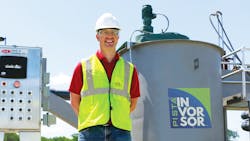Grit removal system
Smith & Loveless Inc., a global leader in advanced grit removal system technologies, recently announced its next-generation grit chamber innovation, PISTA INVORSOR, which is designed to capture industry-best ultra-fine grit particles down to 75-micron particles across all flow conditions.
Backed by years of expert CFD modeling, thorough factory-testing in S&L’s exclusive Grit Removal Research Center at its Kansas City-area headquarters, and extensive, multi-year field application at actual water resource recovery facilities, the patent-pending INVORSOR combines two advanced particle separation processes — flat floor hydraulic vortex and inclined plate settling — in one chamber to successfully achieve 95% removal of ultra-fine particles as small as 75 microns. A key distinguishing factor of this new technology is the consistent high removal efficiency attained all flow conditions, including low flow, daily flow and peak flow conditions, meaning performance is never de-rated at peak.
“We really took it to the next level,” said Smith & Loveless president Frank J. Rebori. “We combined the great efficiencies of the PISTA flat-floor vortex and combined it with enhanced settling by inclined plates meeting a defined surface overflow rate [SOR].”
This allows the system to be sized by flow or by a defined cut particle size. Compared to other fine particle grit removal systems, the INVORSOR delivers lower capital and operational costs, larger capacity in individual units, greater design flexibility for inlet-outlet design options, and a high surface area-to-volume ratio to generate consistent fine grit capture during low flow, daily flow and peak flow conditions — up to 50 MGD in single units [190,000 m3/d].
